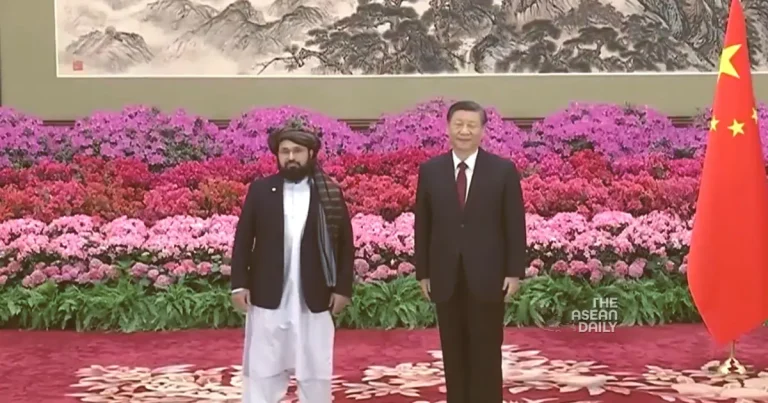3-2-2024 (BEIJING) Chinese President Xi Jinping formally accepted the credentials of Ambassador Asadullah Bilal Karimi from Afghanistan’s Taliban government in a ceremony held on January 30, 2024.
While China’s Foreign Ministry has not yet confirmed whether it has extended full diplomatic recognition to the Taliban administration in Afghanistan, the ceremony took place at the Great Hall of the People, where envoys from various countries, including Cuba, Iran, and Pakistan, presented their credentials to President Xi.
Videos and images from the ceremony captured the moment when Ambassador Karimi approached President Xi to present his credentials, which Xi accepted. However, the formal declaration of diplomatic recognition is not always explicitly stated, and there are differing interpretations among diplomats regarding whether Xi’s actions signify formal recognition, as reported by Voice of America (VOA).
Javid Ahmad, the Afghan ambassador to the United Arab Emirates during the former Afghan government, stated to VOA that the gesture indicates clear recognition by China. Conversely, Matthew Miller, spokesperson for the U.S. State Department, remarked that it is incumbent upon Chinese officials to clarify whether the country officially acknowledges the Taliban regime.
During a press briefing on January 31, 2024, Foreign Ministry spokesperson Wang Wenbin refrained from directly addressing questions regarding China’s stance on the matter. Wang emphasized that China’s reception of the new Afghan ambassador and the presentation of credentials is a routine diplomatic procedure. He reiterated China’s commitment to fostering friendly relations with all Afghan people and advocated for Afghanistan’s inclusion in the international community.
China’s growing diplomatic and economic ties with Afghanistan have been notable, with China appointing the first ambassador to Kabul in September 2023. This burgeoning relationship holds potential for China to access Afghanistan’s mineral resources and establish the nation as a market for Chinese goods.
Furthermore, China’s abstention, alongside Russia, from a United Nations Security Council resolution advocating for the appointment of a special envoy to Afghanistan signals its diplomatic approach. However, Russian Foreign Minister Sergey Lavrov clarified in a media briefing following a UN Security Council meeting on January 24, 2024, that Russia does not officially recognise the Taliban government.
Despite China’s move, other UN member states have not extended recognition to the Taliban’s Islamic Emirate of Afghanistan, with the United Nations consistently denying their requests for representation. The Taliban’s return to power in Afghanistan in 2021, following the withdrawal of U.S. forces, prompted global concern. The group’s strict enforcement of Sharia law and restrictions on women’s rights have drawn criticism and led to economic and political sanctions from the U.S. and European countries.
Human Rights Watch has reported widespread food insecurity among over 90 per cent of the Afghan population following the Taliban’s resurgence, highlighting the pressing humanitarian challenges facing the country.




